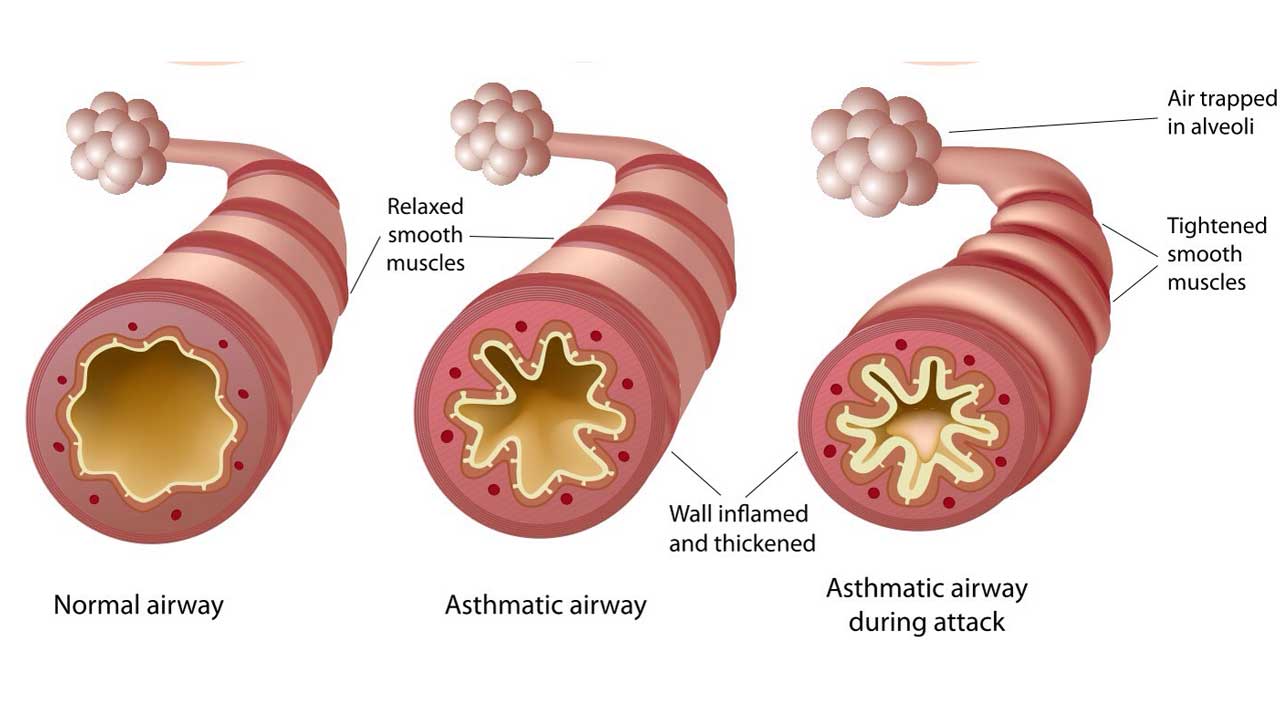
As World Asthma Day comes up on Tuesday, experts have cautioned person who are susceptible to shun things that could trigger the ailment. Similarly, they should avoid smoking, wash curtains and beddings regularly, clean surfaces with damp cloths, avoid dusty areas, as well as regularly clean fans and change air-conditioner filters, among others.
Consultant Respiratory Physician at Lagos State College of Medicine (LASCOM), Lagos State University Teaching Hospital (LASUTH), Dr. Olayinka Olufunke Adeyeye said asthma is a chronic respiratory condition in which the sufferers’ airways are inflamed, the muscles of the airways contract and the airway linings are twitchy, swollen and the lumen becomes smaller with limitation to airflow.
She said: “The sufferers have chronic cough, particularly at night, episodic breathlessness, chest tightness and noisy breathing wheeze. This occurs on and off and may get better with or without treatment. Some patients may complain of cold that frequently becomes chesty.
“Asthma results from a complex interactions between genetics and environment. Some types of asthma are inherited, some run in families, whereby some members have what is called atopy. This includes itchy eyes, recurrent running nose and some skin diseases and atopic dermatitis.
“Interaction with the environment leads to development of such symptoms as air pollution, both indoor and outdoor. Some individuals are allergic to dust mite and cockroaches, among others. In the younger age, more males are affected compared to females, but after 14 years, more females will be at risk of having asthma. Obesity also increases the likelihood of developing asthma.”
Adeyeye explained that exposure to certain triggers, such as dust and exrcise can lead to development of symptoms in those that are already predisposed.
She said: “Although asthma cannot be cured, it can be totally controlled. The process required cooperation between the patient and healthcare managers. Treatment of an asthmatic is not only with medication. There must be good and continuous education about the disease, the long-term nature and the need for the sufferer to take charge. He or she needs to know about the triggers, dust, cold, change in weather, exercise and emotional issues, all of which can increase the symptoms.
“Patients should avoid non-steroidal anti-inflammatory drugs (NSAID) for pain relief and B blockers, among others. Drug treatment includes, reliever medications and preventer medications.
“The preventer medications are those the patients must use every day, whether or not they have any symptoms, while the reliever medications are used only when they have symptoms to ameliorate it. Unfortunately in our environment, many asthma sufferers are under-treated and so suffer immense discomfort, hospitalisation, absenteeism from work and school, with even the risk of death from a severe attack just because they are not taking preventer medications.”
Adeyeye said asthma is common and that sufferers can have good quality life, be productive and be symptom free. But to achieve this, they need to partner with their doctors to achieve total control.
“It is not a thing to be ashamed of,” she explained. “An asthmatic needs clean environment, and should understand his/her triggers and avoid them. He/she will need to have daily preventer medications and reliever medications to be used when necessary. Asthma need not limit anyone’s aspiration. There is need for more awareness about asthma.
“There is need for government to increase awareness about asthma, so that cases can be diagnosed early and treatment commence. Government needs to partner with pharmaceutical companies to make available low cost medicine for asthma sufferers.”
A Family Physician Dr. Chukwuma Ogunbor, said: “Although asthma most commonly develops in early childhood, a significant percentage of sufferers have their first attack during adulthood. This is known as adult-onset asthma (AOA).
“It is impossible to predict when asthma will strike, and the best course of action is to steer clear of so-called triggers. A trigger is anything that causes inflammation in the airways, leading to asthma symptom.”
He urged parents to protect their children against dust mites, which are tiny insects that feed off human skin and hair and are one of the most common asthma triggers. They tend to live in beds, carpeting, upholstered furniture and soft toys.
“Dust mites can be killed by steam-cleaning mattresses and furniture and washing clothes, toys and bedding at temperatures higher than 55ºC.
Children should avoid contact with pets. This is because at least 30 per cent of people with asthma are allergic to animals, especially those that have dogs.
“However, pets are not to blame, just that people should try to protect their children from playing with pets. The problem is the body’s reaction to a protein found in the animal’s dander, dead skin flakes, saliva, urine and feathers. If you have a pet, limit your child’s exposure to the animal.
“People should also limit their stress level because people who are under stress tend to have higher asthma rates. Researches have shown that up to 69 per cent of asthmatics regard stress as a trigger.
“Stress causes the so-called “fight or flight” response in our bodies, involving a surge of hormones like adrenaline and cortisol. This leads to among other things shallow and fast breathing, which puts us at a higher risk of asthma symptoms like tight chest and coughing.
“It is very important for asthma patients to get vaccinated for influenza and pneumonia. Staying current with vaccinations can prevent flu and pneumonia from triggering asthma flare-ups.”






